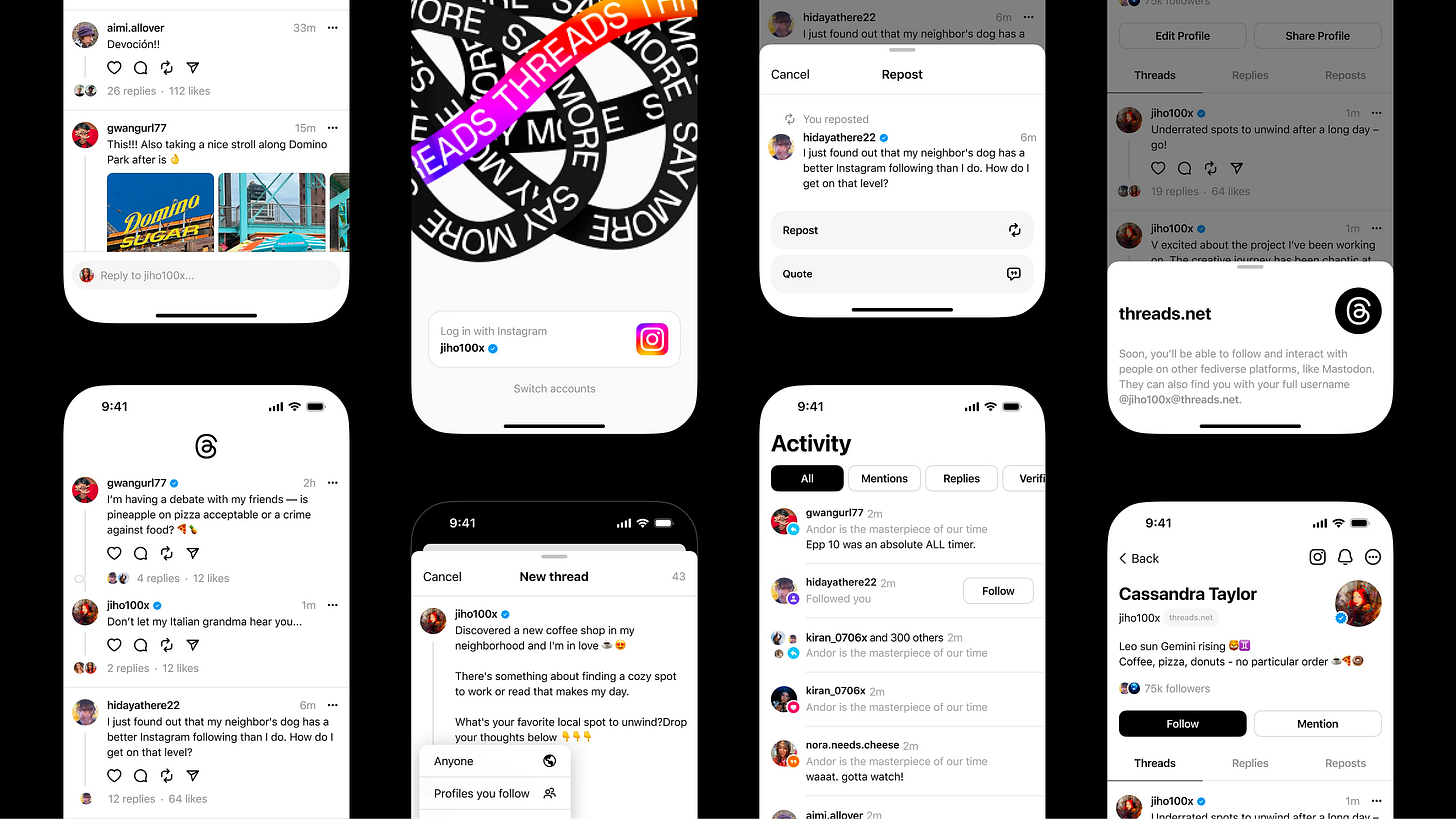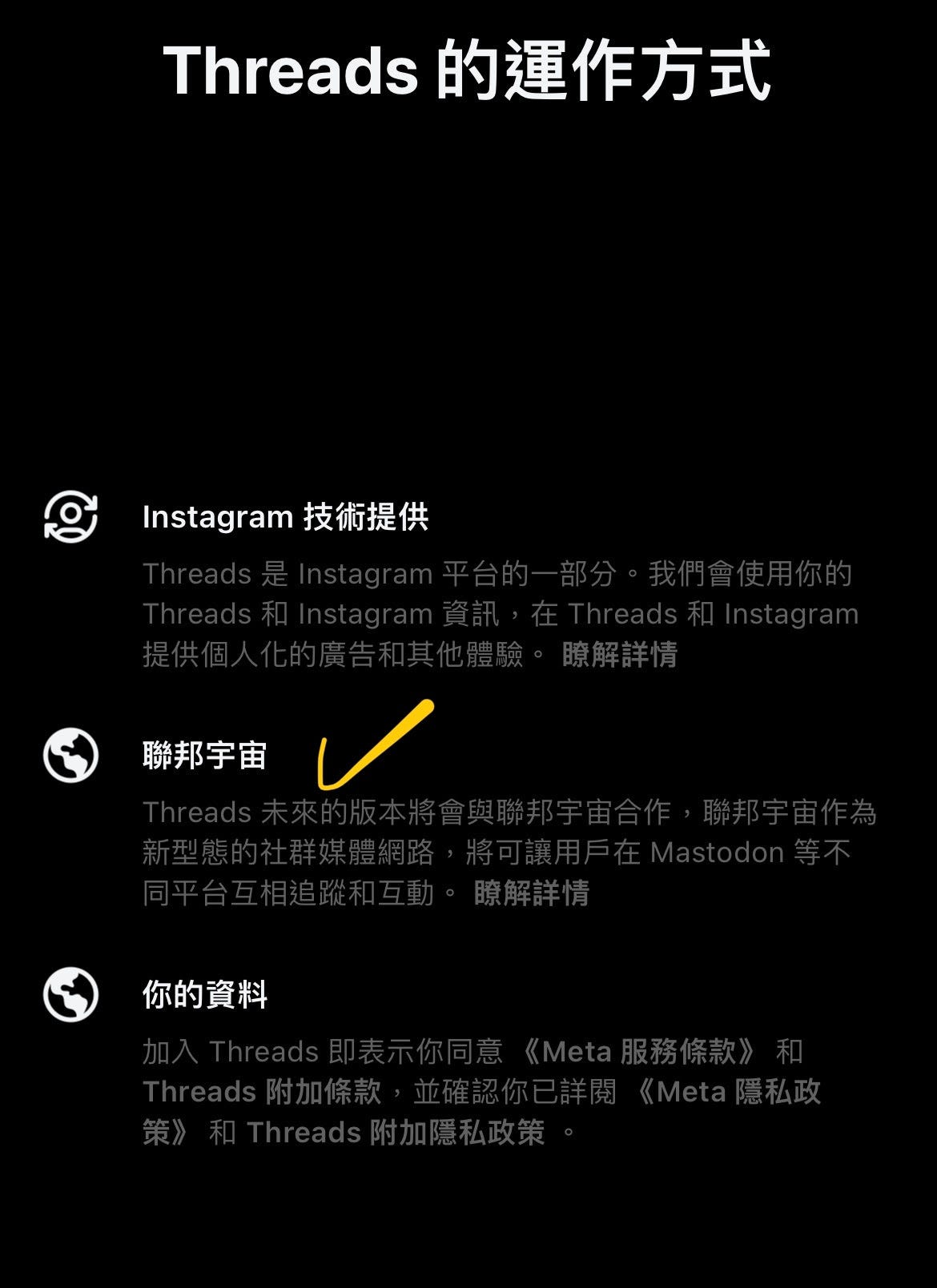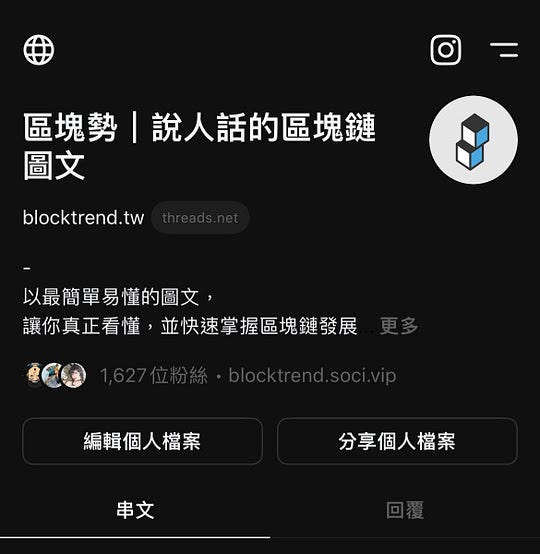GM,
Last week, Instagram (hereinafter referred to as IG) launched a new social application called Threads. On its first day of release, the global user count surpassed 30 million. Even ChatGPT, after its launch, reached the milestone of 1 million users on the 5th day "only." Yesterday, Threads further became the fastest mobile application to surpass 100 million downloads in history.
There has been a rich discussion about Threads on the internet, with everyone eager to know what makes this app special. Among the numerous answers, almost everyone missed one core feature: Threads joining Fediverse- a significant milestone in Meta's transition from closed centralized social platforms to open decentralized social networks. Although the Blocktrend feature is not yet activated, Threads has already become the largest "quasi" decentralized social application globally.
This article discusses what Federated Universe is and how Threads achieves decentralized social networking.
What happened to the old platforms?
Each person has multiple sets of social media accounts, but whenever a new platform emerges, they can't help but create yet another account. Most people do it out of curiosity, while brands and influencers hope to seize the early traffic advantage of the new platform. What if it becomes the next mainstream platform?
We have all witnessed how once dominant platforms turn into deserted ghost towns. For me, that platform was called "Wretch," and who knows if there will be another "Facebook" or even "Twitter" in the future. Platforms come and go, but no one wants their carefully curated content and friendships to disappear with the platform. Hence, people are always searching for the next refuge where they can preserve memories and relationships.
While Facebook constantly adjusts its algorithms and management mechanisms, scams and bots continue to proliferate. Twitter, on the other hand, takes it to another level. My Twitter account is flooded with scam mentions every day. These bots have long paralyzed my notification function — since all notifications are scam mentions, it's easier to simply ignore them than to report them all.
After Elon Musk took over, Twitter became even more chaotic. What everyone wants is simple — a stable, neutral, and sustainable social media platform. However, it seems that all platform operators are at odds with their users. The more they tweak the algorithms, the stranger they become. Before people share content, they have to become "psychics" and guess whether the platform currently prefers text, images, or videos.
Although people have gradually become accustomed to these situations, the accumulation of dissatisfaction eventually finds an outlet. Recently, Twitter added a "login wall," forcing users to log in to browse, and started limiting the number of posts free users can view, essentially coercing users to pay for subscriptions. This has sparked considerable public discontent. The more unsettled people feel, the more motivated they are to actively try new platforms.
Instagram's launch of Threads at this time is undoubtedly a calculated move, taking into account that people's negative sentiments towards Twitter are reaching their breaking point. People are hoping to find the next platform that can replace Twitter, and the appearance of Threads, which has an interface almost identical to Twitter, is like a long-awaited rain after a drought. Even though people know that Threads was created by Zuckerberg, they are still willing to give it a try.
What is the Federated Universe?
According to the introduction provided by Instagram (IG):
Mark Zuckerberg just unveiled the initial version of Threads, a text-sharing application developed by the IG team. Whether you're any type of creator, Threads offers a new independent space for real-time updates and public conversations. We are working hard to make Threads compatible with open and interoperable social networks, as we believe these networks can shape the future of the internet.
To use Threads, you need to log in with an IG account. IG is an app popular among young people, which may leave some people excluded. However, if you successfully log in, you will see the following explanation, stating the close integration between Threads and IG, the future interoperability between Threads and the Federated Universe, and the need to agree to the privacy terms to continue using the app. The major highlight is the Federated Universe, which transforms Threads from a closed social platform into an open social network.
According to the explanation provided by Instagram (IG):
Threads' future versions will collaborate with the Federated Universe, a new form of social media network that allows users to follow and interact with each other across different platforms like Mastodon. The Federated Universe is a community network composed of independently operated servers run by third parties, which are interconnected and able to communicate with each other. Although each server on the Federated Universe operates independently, they can engage in conversations with other servers operating on the same communication protocol within the Federated Universe. Our plan is for Threads to use a communication protocol called "ActivityPub" to interact with other servers that support this protocol.
The Federated Universe is an open social network. The name may sound unfamiliar, but its operation is similar to the familiar concept of email.
If you want to send a message to Outlook users, you don't have to register an Outlook account. You can use Gmail or Yahoo Mail to communicate with Outlook users via email. The advantage of an open network is that everyone can choose what they prefer. Even though everyone's choices may differ, they can still communicate with each other.
This is in stark contrast to the operating model of mainstream social platforms. Currently, friends on Facebook can only interact within Facebook and cannot bring their friends to Twitter, Weibo, or TikTok. Platforms lock content and users within their own walls, turning users into cash cows. If users want to leave Facebook, they have to give up everything they have built on the platform and start from scratch, which comes at a high cost.
The Federated Universe can be seen as bringing the concept of email to social platforms. In the future, users will see content from users on other different social platforms on Threads and can even follow, like, and comment on them.
When we receive an email, we may notice the sender's address ending. A gmail.com ending indicates that it is a Gmail user, while blocktrend.today indicates an employee of Blocktrend. In the future, people will also see account endings on social platforms. For example, mn@liker.socialrepresents that I am from the LikeCoin community, and g0v.social represents being part of the g0v community. Currently, every Threads user also has their own ending, "threads.net." Blocktrend's account in the Federated Universe would be blocktrend.tw@threads.net.
The account ending can indeed signify personal information and convey the values you identify with. For example, seeing an email ending with proton.memay indicate that the person values email privacy. If the ending is 163.com, it's more likely that the person is Chinese. In the future, people can also make judgments about Threads accounts based on their endings. Even if you don't know the author of a post, if their account ends with liker.social, it would be fine to discuss topics like LikeCoin or decentralized publishing with them.
Furthermore, within the Federated Universe, each social platform is like a country. The platforms have a "country-to-country" relationship, but each platform has its own citizens and content moderation standards. Currently, browsing Threads may not reveal many differences from previous social platforms. However, once Threads initiates the Federated Universe and establishes diplomatic relations with the g0v community, users from both sides can follow each other. Conversely, if Threads blocks g0v, Threads users won't be able to become friends with g0v users or see each other's content.
In the future, the content that will appear on Threads depends on each social platform's "domestic" and "foreign" policies. Domestic policies determine what content can remain on the Threads platform, while foreign policies determine how far the content can reach.
I have a friend who runs a fan page related to sexuality, and her account has been forcibly suspended by IG more than 10 times over the years. Although she remains resilient, if Threads opens up the Federated Universe in the future, theoretically, she can move to other social platforms that are more friendly towards "sexuality" and use the mechanisms of the Federated Universe to extend her content to the fans who are already on Threads. Even if the content is eventually hidden by Threads, her account won't be suspended again. If she wants to encourage users to leave "sexually restrictive" Threads, she won't have to worry about losing followers.
By this point, many of you must be curious about why Threads chose to embrace decentralization.
Why did Threads embrace decentralization?
According to Adam Mosseri, the product lead at Instagram (IG):
I believe that more and more people are becoming interested in open social platforms, and I see it as the direction the industry is heading in. It's a painful transition for existing major platforms. However, as people gain a better understanding of the benefits and risks of open platforms, they will demand more. Creators are a perfect example.
Creators are becoming increasingly savvy. They are operating on multiple platforms simultaneously. The days of creators being solely dependent on one platform are diminishing because they are concerned about the unknown risks of relying too heavily on a single company. ... I believe that ordinary creators on IG might not know what Mastodon or ActivityPub are, and they might not need to know. But when they start thinking about the implications behind it, some very interesting ideas arise. One of the most resonating ideas for creators is that fans should be owned by the creators themselves. If one day you decide to leave Threads, you should be able to take your fans with you.
The time and space background is what truly sets Threads apart! Its inherent assumption is completely different from Facebook, IG, and Twitter. Back then, people were not as cautious and fearful of centralized platforms and were willing to move from one platform to another. But now, everyone manages multiple platforms simultaneously, further dispersing the risks.
IG seized this opportunity and launched Threads as a new option that doesn't lock users within the platform. In fact, it actively helps users discover potential users from different social platforms. Once the Federated Universe feature is activated, Threads will automatically distribute creators' content to various "community federations." This not only disrupts the operating logic of traditional social platforms but also fulfills a dream for creators.
However, don't have unrealistic expectations about Meta because Threads is still a centralized platform with its own content algorithm and will rely on an advertising model for sustainability in the future. Content that should be blocked will likely still be censored. The difference lies in the fact that if you dislike the ads or the management rules, you can switch platforms at any time. No need to feel sentimental.
It's similar to someone disliking the ads and email categorization rules on Gmail, so they switch to other email clients that better suit their work style, such as Spark Mail. Even if they're not used to it, they can always switch back or try different products. Email can be carried along wherever they go. The Federated Universe allows people to carry their social graph with them, without being tied to a specific platform.
I believe that Threads' positioning is closer to being the "Gmail" of the Federated Universe. Although Gmail is not the only email service provider on the market, it is the top choice for the majority when creating an email account.
In the end, each social platform will develop its own unique character based on its content algorithm. For example, Mosseri mentioned that Threads is less receptive to political and news discussions because the moderation costs for such content are too high. He hopes that Threads will become an entertainment hub where people can discuss topics like travel, food, and movies. The Federated Universe allows each social platform to specialize further and delegate more challenging content moderation to others.
Although I am optimistic about the open social network represented by the Federated Universe and agree with Mosseri's vision for the future, I still hesitate to say that Threads will be successful. On one hand, I'm not sure how long people's enthusiasm for Threads' novelty will last, and on the other hand, there are not many social platforms currently joining the Federated Universe, each with its own governance challenges. However, if Threads succeeds in retaining users, it could potentially be the last time people have to "reorganize their lives" on a social platform.
Blocktrend is an independent media outlet sustained by reader-paid subscriptions. If you think the articles from Blocktrendare good, feel free to share this article, join the member-created Discord for discussion, or add this article to your Web3 records by collecting the Writing NFT.
In addition, please recommend Blocktrend to your friends and family. If you want to review past content published by Blocktrend, you can refer to the article list. As many readers often ask for my referral codes, I have compiled them into a single page for everyone's convenience. You are welcome to use them.





